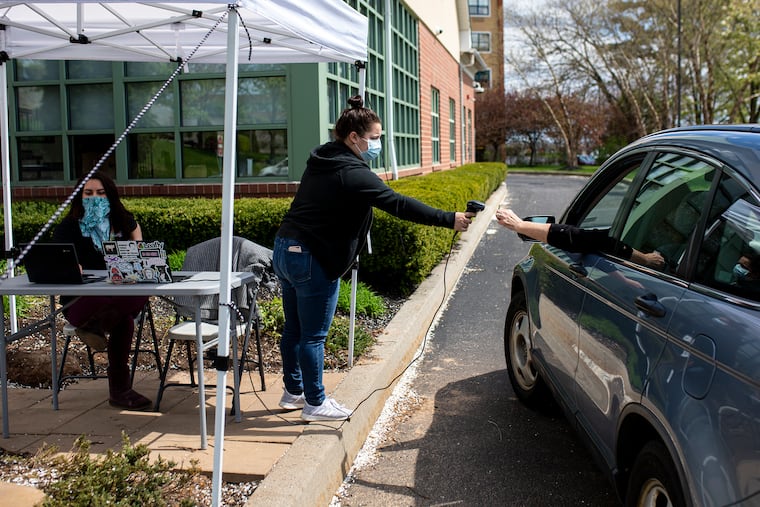From drive thru to home delivery, how coronavirus has unshackled Pa.’s marijuana industry
Disruptions caused by public health crisis has triggered several temporary changes including cashless transactions, use of telemedicine, and de facto home delivery.

Out of crisis comes opportunity.
The coronavirus pandemic has slowed most traditional business to a dead stop. But in Pennsylvania, it has sparked a near revolution in the way the marijuana industry operates.
“It’s a hell of a thing,” said William G. Roark, a Philadelphia-area attorney with a cannabis law practice. “We may not be able to buy bourbon at a liquor store, but we now live in a world where we have drive-thru medical marijuana.”
Gov. Tom Wolf was one of the first governors in the nation to call medical marijuana growers and dispensaries “essential businesses.” That declaration in mid-March served as a catalyst, creating temporary changes that most cannabis advocates and business owners thought might take years to implement — cashless transactions, use of telemedicine, and de facto home delivery.
It’s now easier to be certified as a patient. The process is friendlier and less cumbersome. State residents suffering from any one of 23 serious health ailments — from anxiety to chronic pain to cancer — no longer have to visit a doctor in person. They can do it by phone or video conference.
Outfits such as the Sanctuary Wellness Institute in Chester Springs not only guide prospective patients through the process of registering with the state. For at least as long as the pandemic rages, their doctors can confirm an ailment and supply the necessary certification over a platform similar to Skype during a 15-minute appointment. A telemedicine appointment with a doctor typically runs $199.
“Under the temporary rules, you can do it from the safety of your own home," said Beth DiBella, who co-owns the Sanctuary with her husband, John. "It’s really changed the entire nature of our business. What we were several weeks ago and what we are now are two totally different things.”
DiBella said business had picked up dramatically since the pandemic hit. She said her offices have begun to tally as many as 300 calls a day.
“It’s partly because the liquor stores are closed, and for better or worse, people think of marijuana dispensaries in that same category,” DiBella said. “And the anxiety. Everyone feels really uncertain. We try to preserve a sense of calm.”
Purchasing medical marijuana has become streamlined. At least in theory. Patients can order their medical marijuana over the internet, and at least temporarily take advantage of curbside pickup at many dispensaries.
Most dispensaries have adopted a debit card system called CanPay so patients don’t have to carry hundreds of dollars in cash. Using the system costs the dispensary 3.5% per transaction, and they lose out on the fees that many earned by placing ATM fees within their stores. Still, several dispensary owners said it’s worth it to avoid the risk of transmitting the virus through the use of cash.
“No more a loss than if we accepted credit cards," said Greg Rochlin, president of Ilera Healthcare, which operates Apothecarium dispensaries in Plymouth Meeting and Lancaster. The use of credit cards remains forbidden because the federal government considers the sale of marijuana in any form to be illegal.
» READ MORE: Pennsylvania allows curbside pickup and de facto home delivery for medical marijuana
The state expanded the definition of “caregiver” for the purposes of the program. Until two weeks ago, a caregiver could only serve up to five patients. With the relaxed regulations, there are no limits on that number.
“It means you can have one caregiver serve an entire nursing home,” said Jon Cohn, CEO of Agri-Kind, a medical marijuana grower and processor in Chester.
It also allows for home delivery services, though the dispensaries are avoiding that terrm because that method of supply is not expressly permitted under state regulations.
Curbside pickup is not always practical, on the narrow streets of Old City Philadelphia for instance, so some dispensaries are taking marijuana directly to patients at their homes.
Ethos Dispensary, near Washington Square, now uses the expanded caregiver regulations to take phone orders. Staff budtenders, as they are known in the industry and who are registered as caregivers, deliver medicine to patients within a three-mile radius. Reservations placed before 9 p.m. are sent out by a staff member the next business day.
“It makes sense,” said David Clapper, president of Ethos. “In this crazy time many of our patients — several of them with cancer — were telling us they were immunocompromised and didn’t feel comfortable going out. There’s no surcharge."
In Plymouth Meeting, the Apothecarium dispensary occupies a former bank. Now that curbside service is allowed, Ilera has put the former drive-thru lane into service. It’s the first in the state.
“It’s not strictly a drive-thru window, but the customer doesn’t have to get out of their car,” said Rochlin. “With the debit service, they can prepay. One of our employees takes their name and ID. By the time the customer gets to the other side we have the product waiting for them.”
About 180,000 Pennsylvanians are actively participating in the state’s medical marijuana program, according to a Department of Health spokesperson. More than 280,000 have registered. In the two years since sales began, the state says there have been “four million dispensing events.”
The companies recognize that many of the changes will last only as long as the coronavirus poses a threat. For them to become permanent would take a rewrite of the regulations governing the program.
“The crisis has definitely been a catalyst for things we hoped to provide. My hope is that the Department of Health will see we can do this responsibly and safely,” said Blythe Huestis, vice president of retail operations for Beyond / Hello Dispensaries. “That way, it may open the door to these services becoming standard after the pandemic.”
For more coverage of medical marijuana and hemp, visit inquirer.com/cannabis